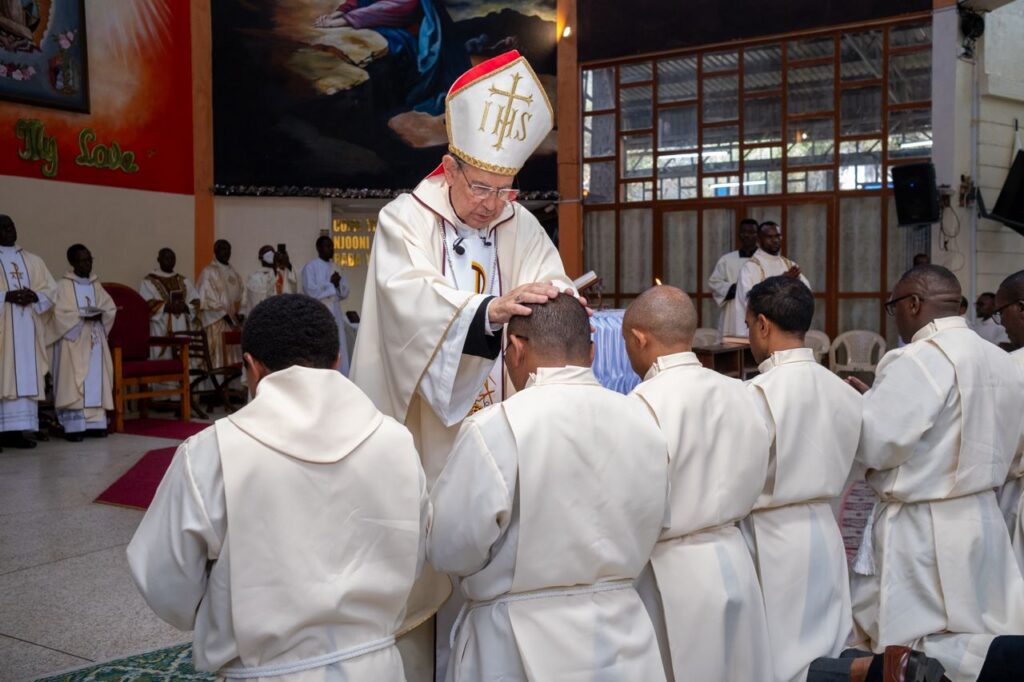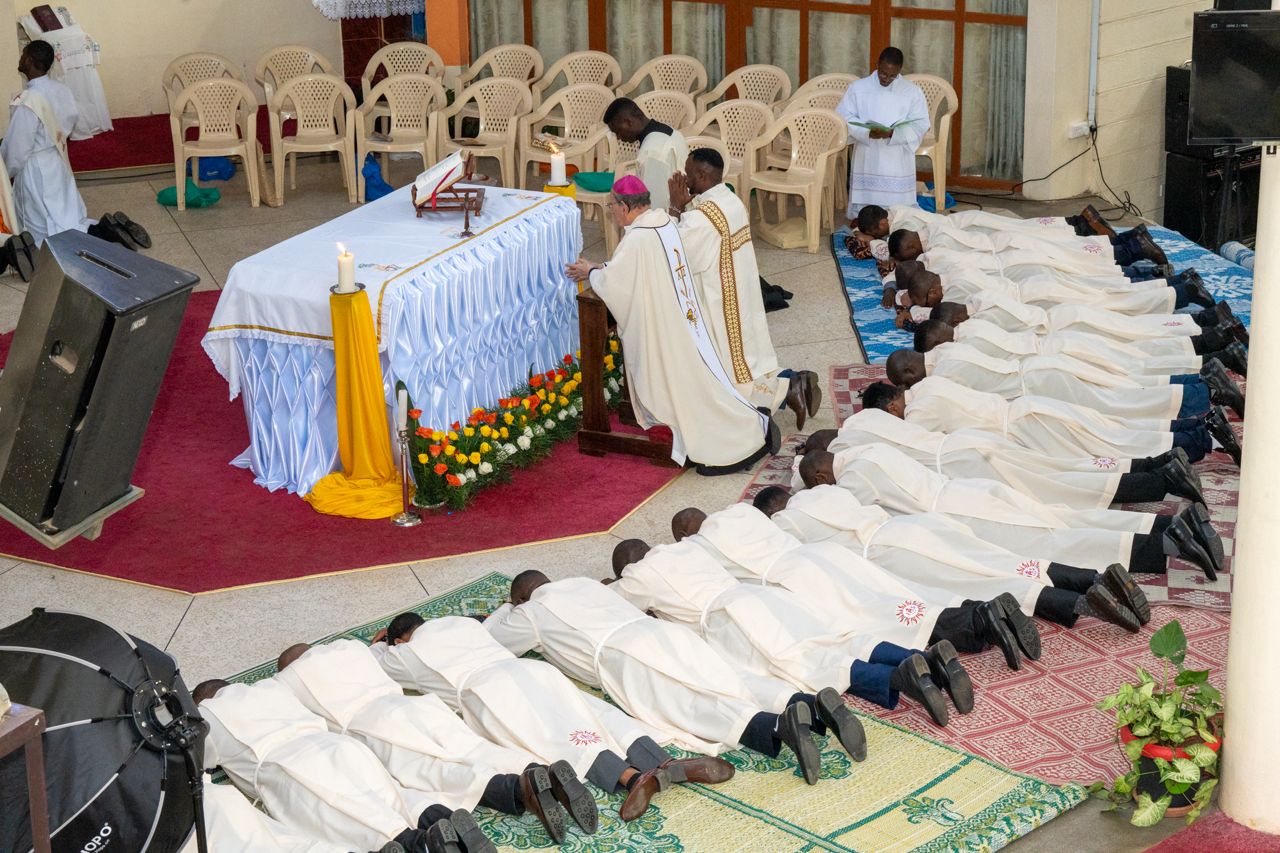KENYA: “You are Deacons Forever, Embrace Servanthood,” Bishop Mejía to 18 New Jesuit Deacons.

Vicar Apostolic Emeritus Rodrigo Mejía , SJ Laying Hands on the New Jesuit Deacons.
Elizabeth Asasha
The Vicar Apostolic Emeritus of Soddo-Hosanna in Ethiopia has emboldened deacons to uphold servanthood even as they ascend the church hierarchy. Speaking on Saturday, February 10, 2024, during the Diaconate Ordination of 18 members of the Society of Jesus, popularly known as “the Jesuits,” Bishop Rodrigo Mejía Saldarriagga SJ reflected on the meaning of the Deaconate.
Bishop Rodrigo highlighted the historical and biblical significance of the deaconate, noting its roots in the early church’s need for assistants in charity and Eucharistic duties, emphasizing Jesus’ example as a deacon, and underscoring the servant nature of the role.
“Jesus Christ is our great high priest, he’s the unique priest of the new covenant but it is equally true that Jesus was also a deacon for a very humble service, to wash the feet of his disciples before the celebration of the first Eucharist,” stated the bishop emeritus.
Mejía clarified the distinction between permanent deacons ordained for lifelong service, and transitional deacons who proceed to priesthood but remain imbued with the spirit of service. He further emphasized that regardless of future roles, all ordained deacons are called to embody the spirit of integral service to humanity.
“Contrary to the titles of the army such as lieutenan, captains and all other ranks, deacons are meant to be servants; servants of the church; servants in the liturgy; servants in the life of people,” the prelate told the 18 deacons who were receiving the diaconate mantle at Our Lady of Guadalupe Catholic Parish in Nairobi, Kenya after undergoing formation for over a decade.
Bishop Mejía who is lauded by many by the popularized phrase Retired but not tired, stressed the permanence of the deaconate, a designation he says remains relevant throughout the lifetime of a priest regardless of whether they rise through the ranks to a higher possie.
“Our ministries are not degrees of promotion of honor and power, but different attitudes of service and that is why, even upon priestly ordination, bishopric or otherwise, we remain deacons.” Noted the bishop reminding congregants that even the pope is a deacon, all service; Servo rum which he explained as a spirituality of service in the charisma, and the seal accorded to deacons to orient them to service, not only liturgical service, but also human service to the church, and the community.
Catholic faithful, men Religious and women including families and friends of the Jesuit brothers from within and from all the 11 countries represented by the Candidates congregated in the church Saturday morning to witness the ordination of the 18 Jesuit ministers.

“Diversity is quite key in the Society of Jesus because we are a universal congregation and by this, we welcome and receive people from different nations, and cultures and enrich our communities with the knowledge and experiences from the vast regions and evangelizing the word to different places.” Explained Fr. Emmanuel Banda, SJ a Liturgist and lecturer in the same discipline at Hekima University College.
Fr. Emmanuel Banda, SJ, highlighted unique aspects of the Diaconate Ordination Mass, such as the litany of saints and the presentation of the gospel book, underscoring their significance in commissioning ministers for service.
He added, “Invoking the saints through the Litany as we commission the deacons is a way of seeking the spiritual assistance of those who have gone before us in faith, asking for their guidance and blessing on the newly ordained deacon as they begin their ministry and service to God’s people.”
The Zimbabwe-born clergy accredited the lengthy formation process as key to the all-round experience required of a missionary.
“It is quite a lengthy process but it is worth it because by the time a candidate gets to be ordained, they are very experienced with a lot of input on their lives,” noted Fr. Banda who remains instrumental in the formation of Religious missionaries in the Jesuit community.
The ordination tradition, held every last Saturday preceding Lent at Hekima University College Jesuit Community, signifies a renewed commitment to service and mission.
Three Kenyans; Kang’ethe Robert, SJ, Mutie Paul Kilonzo, SJ, Mutunga Dominic, SJ, Andriamanga Roger Luc, SJ and Rakotomalala Germain, SJ from the Island country of Madagascar, three among the 18 candidates hail from the Democratic Republic of Congo (DRC); Asifiwe Vughotse Janvier, SJ, Ilunga Kalombola Floribert, SJ and Mwibonere Munazi Paulin, SJ, Munkuli Kelvin, SJ and Nogueira S. Ricardo, SJ from Zimbabwe, Cameroon, a country in Central Africa was represented by Kontche Tchiha H.Frank, SJ and Kouam K. Joël Anselme, SJ. Nigeria, Mozambique, Sudan, Congo Brazzaville, Ethiopia, and Tanzania had one candidate each: Akalefu Alexander, SJ, Macano F. Guidione, SJ, Nahum Osman, SJ, Ntsolani L. Christian, SJ, Baramo Tadele Wolde, SJ, and Sajilo Julius Mark, SJ respectively.


